
*
Queens is having a Heat Wave, a tropical heat wave subtitled The Jack Cole Project. It bowed May 10 "out of town," a little less than 45 minutes from Broadway, at the Queens Theatre (nee Queens Theatre in the Park) and harbors hopes of making that theatrical leap of faith across the river.
A groundbreaking mover-and-shaker of a choreographer for more than four decades, Cole is all but forgotten now. The muse who wore his choreography most brilliantly — Gwen Verdon — extended his afterlife as the tireless keeper of his flame. Since she flickered her last, no one has come forth to take up the torch until now.
Enter an unabashed disciple, director-choreographer Chet Walker, who brought the idea of Fosse to Bob Fosse's family, resulting in the Tony-winning Best Musical of 1999. Hoping for lightning to strike twice, Walker conceived and executed Heat Wave: The Jack Cole Project, a thoughtful re-examination of Cole's unique multi-cultural style of dancing which he relentlessly rattled out of the world globe and re-set to contemporary dance.
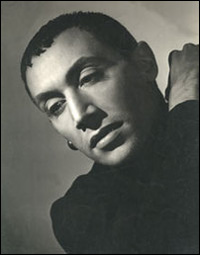 |
||
| Jack Cole |
Granted, a lot of his screen work was second-echelon stuff, but just look at who he was animating. He slipped all the right moves to Betty Grable ("Meet Me After the Show," "Three for the Show"), Rita Hayworth ("Gilda," "Down to Earth," "Tonight and Every Night"), Marilyn Monroe ("Gentlemen Prefer Blondes," "River of No Return," "Let's Make Love" — to say nothing of his uncredited contributions to "There's No Business Like Show Business" and "Some Like It Hot"), Mitzi Gaynor ("The I Don't Care Girl," "Les Girls"), Ann Miller ("Eadie Was a Lady," "The Thrill of Brazil"). He did two versions of "Kismet" (the Marlene Dietrich in '44 and the Dolores Gray in '55) and a harem dance for "David and Bathsheba."
"He understood women," Walker said. "He understood how to do choreography and movement for women to make them sexy and to get them on pedestals."
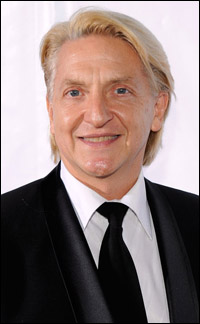 |
||
| Chet Walker |
David Elder from 42nd Street and Rachelle Rak from Catch Me If You Can head a young, breathlessly energetic cast of 15.
"I love this experience," Elder confessed. "For me, certainly, it feels like a good fit. I get to do various things that utilize my different talents — Gene Kelly, Danny Kaye, opera, ballet, the funny stuff. It's like a nice arc of a bunch of different styles for me."
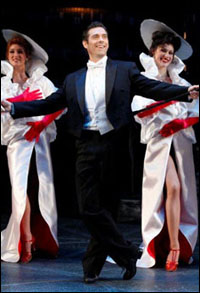 |
||
| Jena VanElslander, David Elder and Lindsay Roginski in Heat Wave. |
||
| photo by Carol Rosegg |
This particular opening pulled some name players and industry folk, among them screen hoofer Eugene Louis Faccuito (a.k.a. "Luigi"), Malcolm Gets, Post scooper Michael Riedel and assorted hot-and-Cole-running dancers. A Chorus Line Tony winner Donna McKechnie, who is touring her one-woman show, My Musical Comedy Life (Pittsfield's Colonial is the next pit-stop July 27), reached Broadway after Cole's heyday. "I always wanted to work with him," she lamented, "but I know so many people who worked with him. Gwen Verdon told me many stories about Jack when he was her guardian and she was just 18 years old and they were doing their nightclub act, and how hard he worked everybody, but he worked just as hard when he was dancing in his own shows.
"When I do my own show, wherever I am, I always mention Jack Cole's name. At a lot of universities where I play, the students haven't heard of him. He's not written up enough in our history, so I think it's my job. I love to say names of people I admire, and he's an important name because he is the father of Broadway dance. There are a lot of people who are our forebears, but Jack Cole is the one who really brought all the elements of different cultures to create contemporary modern dance."
Wicked/Godspell's Stephen Schwartz was another who was left out in the Cole and could only imagine what the choreographer could have done with his "Defying Gravity" Act One finale. "I don't have enough background information on him to appreciate some of it," he admitted, "but I found it very interesting, anyway."
Dancer-choreographer-teacher Jacques D'Amboise — or "Charlotte's dad," as he likes to identify himself — is of Cole vintage and called the performance "a tremendous evening, full of memories. A lot of those dances I saw. Jack, I knew and admired, but we never worked together. I just hung out with all the dancers that had bad knees, and they all said it was his fault."
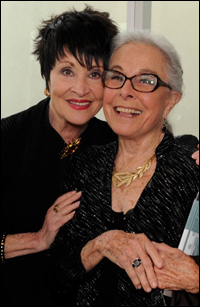 |
||
| Chita Rivera and Marge Champion on opening night |
Chita Rivera, bounding back to Broadway this fall in The Mystery of Edwin Drood, had a Cole show with similar literary roots — Zenda, based on Anthony Hope's swashbuckler, "The Prisoner of Zenda." Even with Anne Rogers and two Alfred Drakes, it never got out of California tryouts.
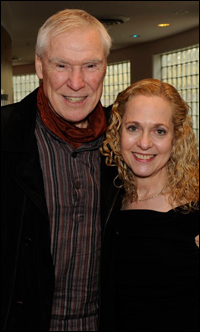 |
||
| Jacques D'Amboise with Vicki Reiss, Executive Director of the Shubert Foundation |
"There was nobody like him. There certainly was not a style like his. He created jazz, really, and was responsible for Carol Haney, Gwen Verdon, Matt Mattox, Buzz Miller — all the great dancers and so many great choreographers, including Fosse. They have some of the foundation of Jack. The mere fact that Chet Walker is brave and passionate enough to bring back his work is phenomenal. I saw some of the show three weeks ago, and the dancers are fabulous. Chet actually gave free classes to these dancers to teach them the technique. You can't just get up and do a Jack Cole number. You need technique, like you need technique for Jerry Robbins and Bob Fosse and Michael Kidd. Nobody knows who Jack is, and they should."
If you don't know Jack, then Heat Wave would definitely be the show for you.










